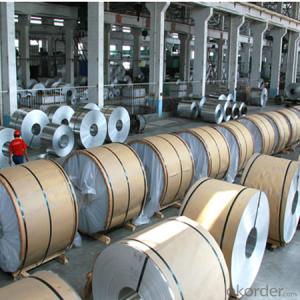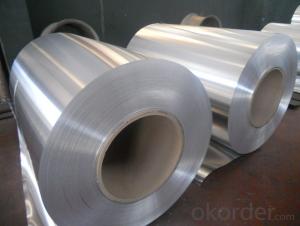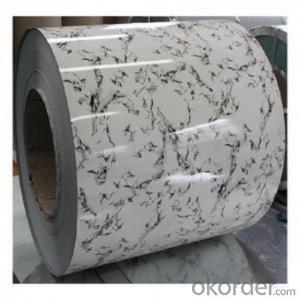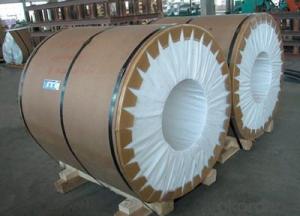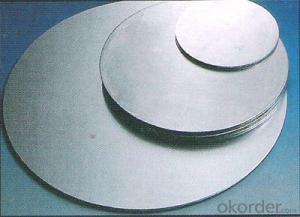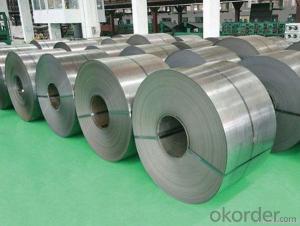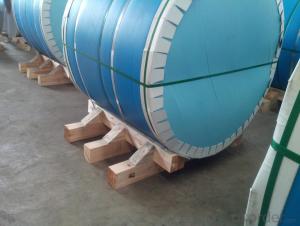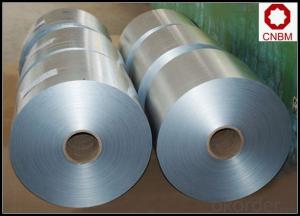High Quality CC Mill Finished Aluminum Coil Slitter
- Loading Port:
- Shanghai
- Payment Terms:
- TT OR LC
- Min Order Qty:
- 5 m.t.
- Supply Capability:
- 10000 m.t./month
OKorder Service Pledge
OKorder Financial Service
You Might Also Like
Specification
1. Specification of CC Mill Finished Aluminum Coil with High Quality
Material | Alloy Aluminum 6063,6061,6005 or customer nominated |
Temper | T3, T4, T5, T6 |
Surface | Anodize, electrophoresis, powder coating, PVDF coating, wood grain painting, matted, etc. |
Colour | Any colour based on Standard Germany RAL Mark |
Length | Coating 6.5 meters, Anodizing 6.5 meters, Mill finish 5 meters |
Press Machine | 500-4000 tons all together 64 press lines. |
Fabrication | 1. Windows and doors; 2. Drilling; 3. Bending; 4. Cutting; 5. etc. |
Certificate | ISO 9001 |
Moulding | 1. Using our moulds, no fee; |
2. Using customer drawing, opening mould, usually about 10~50 tons then the moulding can be refunded. | |
3. Mould cost is negotiable base on the order quantity | |
Capability | Annual output 100,000 tons |
2. Application of CC Mill Finished Aluminum Coil with High Quality
(1).Interior: wall cladding, ceilings, bathrooms, kitchens and balconies, shutters, doors...
(2).Exterior: wall cladding, facades, roofing, canopies, tunnels,column covers , renovations...
(3).Advertisement: display platforms, signboards, fascia, shop fronts...
3. Feature of CC Mill Finished Aluminum Coil with High Quality
*Such coil is specially designed to replace aluminum ingot, due to the high export tax of aluminum ingot, the coil has better price than ingot.
*This type of coil can fit customer's remelting furnace just like ingot, no need to make any change to the production line that was previously used for ingot. The standard coil size and weight is very suitable for the feed gate of furnace.
*This type of coil causes less material wastage than ingot when remelted.
*Our coil is made directly from ore, no need to go though the ingot making process, quality is much better than other suppliers who use ingot scrap to make coil.
Be free from Oil Stain, Dent, Inclusion, Scratches, Stain, Oxide Dicoloration, Breaks, Corrosion, Roll Marks, Dirt Streaks and other defect which will interfere with use
4. Certificate:
SGS and ROHS(if client request, paid by client), MTC(plant provided), Certificate of Origin(FORM A, FORM E, CO), Bureau Veritas and SGS (if client request, paid by client), CIQS certificate
5. Image of CC Mill Finished Aluminum Coil with High Quality
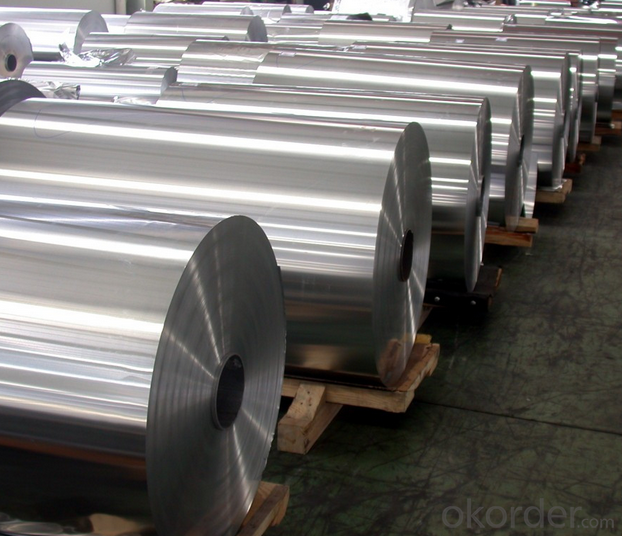
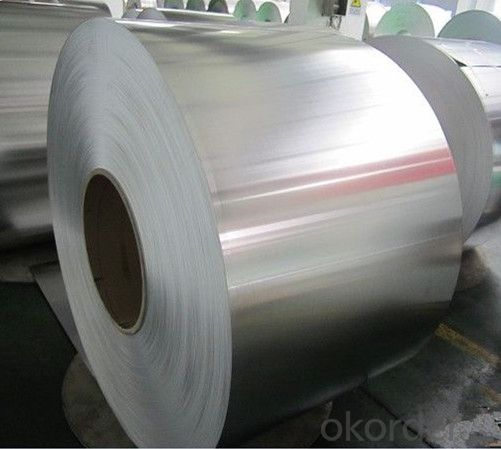
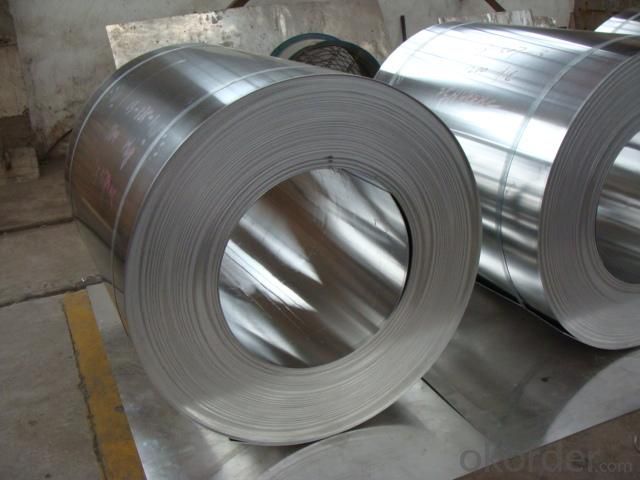
6. Package and shipping of PVEF Color Coating Aluminum Coil with High Quality
eye to wall
eye to the wall
with wood pallet (wooded case also available)
7. FAQ
1) What is the delivery time?
Dpends on actual order, around 20 to 35 days
2)What is the QC system:
We have QC staff of 20 persons and advanced equipment, each production is with MTC traced from Aluminum ingot lot.
3) What market do you mainly sell to?
Australia, America, Asia, Middle East, Western Europe, Africa etc
- Q: like i need a good slogan for aluminum its for a school project like for arsenic's is Arsenic's a sure fire way to deal with a rat, It works better than a mean old cat!
- Aluminum: Keeping stoners amazed for over 50 years!
- Q: Is it possible to use an aluminum coil as a paperweight for holding down papers?
- <p>Yes, you can use an aluminum coil as a paperweight. Aluminum is a lightweight and sturdy metal that can effectively hold down papers on a desk. Its weight and shape make it suitable for this purpose. However, ensure the coil is clean and smooth to avoid any damage to the papers or surfaces it comes into contact with. Additionally, consider the size and thickness of the coil to ensure it provides enough weight to keep your papers in place.</p>
- Q: Can aluminum coils be used in pharmaceutical manufacturing?
- Pharmaceutical manufacturing can indeed utilize aluminum coils. In the pharmaceutical industry, aluminum is commonly employed for diverse tasks like packaging and manufacturing equipment. Aluminum coils are capable of producing containers, caps, and closures for pharmaceutical products. Particularly, these coils find extensive use in the manufacturing of blister packs, which are widely employed for packaging tablets and capsules. The preference for aluminum in pharmaceutical manufacturing is due to its exceptional barrier properties, resistance to corrosion, and capacity to safeguard the integrity of pharmaceutical products. Furthermore, aluminum possesses the advantages of being lightweight, recyclable, and having a low melting point, rendering it a versatile and cost-efficient option for pharmaceutical manufacturing.
- Q: Can aluminum coils be used in the production of aluminum sandwich panels?
- Yes, aluminum coils can be used in the production of aluminum sandwich panels. Aluminum coils are typically used as the outer skins or facings of the sandwich panels. These coils are first processed and coated to enhance their durability, corrosion resistance, and aesthetic appeal. They are then bonded with a core material, such as polyethylene or mineral wool, to create a lightweight and rigid sandwich panel structure. The aluminum coils provide the panels with excellent mechanical properties, such as high strength-to-weight ratio, good flexibility, and thermal conductivity. Additionally, the use of aluminum coils in the production of sandwich panels allows for easy customization, as they can be formed, shaped, and painted according to the desired design and specifications.
- Q: What are the different forming processes for aluminum coils?
- Some of the different forming processes for aluminum coils include rolling, coiling, slitting, and annealing.
- Q: How are aluminum coils protected against mechanical damage?
- To safeguard aluminum coils from mechanical harm, multiple methods are employed. One of the primary techniques involves the application of a protective coating or finish to the coil's surface. This coating acts as a shield, preventing any potential sources of mechanical damage, such as impact or abrasion, from affecting the coil. The coating itself can either be a standard paint or a specialized aluminum coating, offering enhanced durability and resistance to scratching or denting. Apart from the protective coating, aluminum coils may also undergo reinforcement with an additional layer of laminate or film. This supplementary layer provides an extra level of defense against mechanical damage, effectively warding off dents or scratches. The application of the laminate or film can occur during the manufacturing process or as a separate step following coil production. Furthermore, to minimize the risk of mechanical damage during transportation or storage, aluminum coils can be wrapped or packaged in protective materials like plastic or foam. These wrappings serve to cushion the coil and create a barrier against potential impacts or heavy objects that could cause damage. In conclusion, a combination of protective coatings, laminates, and packaging materials ensures the adequate protection of aluminum coils from mechanical harm. These measures are instrumental in preserving the integrity and quality of the coils, enabling them to effectively fulfill diverse applications.
- Q: This question asks for a comparison between aluminum coils and other metal coils, highlighting their distinct characteristics.
- <p>Aluminum coil is distinct from other metal coils due to its lightweight, high corrosion resistance, and excellent thermal and electrical conductivity. Compared to steel coils, aluminum coils are softer and more ductile, making them easier to bend and shape without breaking. They are also non-magnetic and have a lower melting point. Copper coils, on the other hand, have superior electrical conductivity but are heavier and more expensive. Zinc coils offer good corrosion resistance but are less ductile and have lower strength. Each metal coil has specific properties that make them suitable for different applications, such as construction, electrical wiring, or automotive parts.</p>
- Q: How do aluminum coils compare to plastic coils in terms of durability?
- Aluminum coils are generally more durable than plastic coils. They are resistant to corrosion and can withstand high temperatures, making them suitable for various applications. Plastic coils, on the other hand, are more prone to wear and tear, especially in harsh environments or with heavy usage. While both types have their own advantages, aluminum coils are generally considered to be more durable in the long run.
- Q: How do aluminum coils perform in corrosive environments?
- Aluminum coils perform exceptionally well in corrosive environments due to their inherent properties and protective coatings. Aluminum has a natural oxide layer that forms on its surface when exposed to air, creating a protective barrier against corrosion. This oxide layer is highly resistant to many corrosive agents, such as saltwater, acids, and atmospheric pollutants. Additionally, aluminum coils can be further protected with various coatings and treatments to enhance their resistance to corrosion. These coatings can include organic coatings, such as paint or lacquer, or inorganic coatings like anodizing or chemical conversion coatings. The combination of aluminum's natural oxide layer and additional protective coatings makes aluminum coils highly durable and reliable in corrosive environments. This resistance to corrosion is particularly beneficial in industries such as marine, chemical processing, and coastal applications, where exposure to saltwater or aggressive chemicals is common. Moreover, aluminum coils are lightweight, which adds to their versatility and ease of installation, making them suitable for a wide range of corrosive environments. This lightweight property also contributes to reducing transportation costs and energy consumption during installation. In summary, aluminum coils are well-suited for corrosive environments due to their natural corrosion resistance and the availability of protective coatings. Their durability, lightweight nature, and resistance to corrosion make them an optimal choice for various industries and applications, where longevity and performance are crucial factors.
- Q: Can aluminum coils withstand extreme temperatures?
- Aluminum coils have gained a reputation for their remarkable capability to endure extreme temperatures. With a melting point of 660.32°C (1220.58°F), aluminum proves to be an ideal material for tasks demanding heat resistance. HVAC systems, for instance, frequently employ aluminum coils that are exposed to both high and low temperatures. Similarly, automotive radiators rely on aluminum coils to withstand elevated operating temperatures. Moreover, the outstanding thermal conductivity of aluminum enables efficient heat transfer away from the coil, further bolstering its ability to withstand extreme temperatures. All in all, aluminum coils stand as a dependable and long-lasting option for applications that necessitate resistance to severe temperature conditions.
Send your message to us
High Quality CC Mill Finished Aluminum Coil Slitter
- Loading Port:
- Shanghai
- Payment Terms:
- TT OR LC
- Min Order Qty:
- 5 m.t.
- Supply Capability:
- 10000 m.t./month
OKorder Service Pledge
OKorder Financial Service
Similar products
Hot products
Hot Searches
Related keywords
